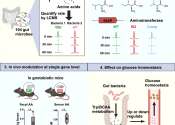Single-cell analysis reveals mechanisms of a common complication of Crohn's disease
Mount Sinai researchers have published the first study to use single-cell analysis in identifying several pathophysiological mechanisms of abnormal passageways in the digestive system known as perianal fistulae, a common ...
18 hours ago
0
22








